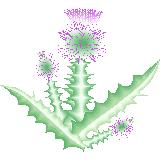Latin Name
Silybum marianum

General Description
Milk thistle, a plant that reaches 5 feet in height and thrives both in the wild and
in the garden, is used by herbalists to treat such liver disorders as
cirrhosis and hepatitis. The active
ingredient, silymarin, is found in the seeds. It is believed that silymarin prompts the
manufacture of new, healthy liver cells without encouraging the growth of any malignant
liver tissue that may be present. Silymarin, it is thought, also serves as an antioxidant,
protecting liver cells from damage by free radicals, which are harmful byproducts of many
bodily processes including cellular metabolism. The use of silymarin by healthy people can
increase by as much as one-third the liver's content of glutathione, a key substance in
detoxifying many potentially damaging hormones, chemicals, and drugs.
Extracts of silymarin appear to neutralize toxins from the death cup mushroom, which can inflict lethal injury on the liver. Milk thistle also is believed to ease outbreaks of psoriasis, since these may worsen when the liver fails to neutralize certain toxins that circulate in the bloodstream.
Target Ailments
Milk thistle taken internally for:
Preparations
Over the counter:
Available in dried bulk, capsules and extract.
At home:
Tea: 1 tsp. freshly ground seeds steeped in 1 cup boiling water for 10 to 15 minutes. As an alternative to tea, 1 tsp. of the freshly ground
seeds eaten. Milk thistle extract may be more effective than teas, since silymarin is only
slightly soluble in water. See an herbalist for further information.
Special Information